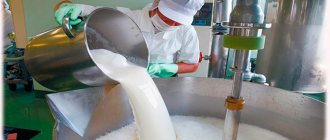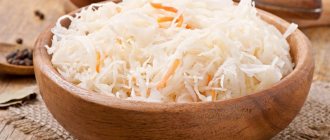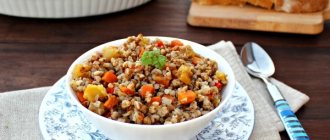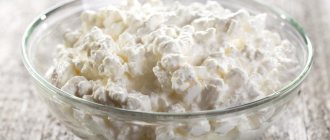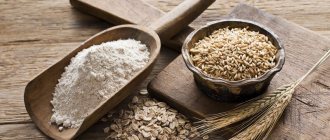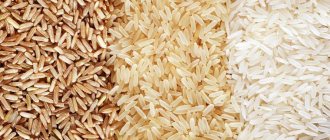01.08.2021 06:00
910
Cottage cheese is divided into several types, one of them is low-fat. For some, low-fat cottage cheese is associated with proper nutrition. Diet fans love to include it in their diet, considering it a good source of calcium and protein. In this article we will talk about whether low-fat cottage cheese is actually healthy and what you need to know about this product.
Composition and calorie content
Low-fat cottage cheese is a low-calorie version of the classic fatty cottage cheese. The composition contains milk with a reduced fat content. All types of cottage cheese are almost the same in composition. The difference is in the amount of lipids.
This product also contains a large amount of protein and casein protein. The calorie content of such a product is about 85 - 110 kcal per 100 g of product.
The amount of fat depends on the degree of processing and can be from 0.1% to 2%. Approximate nutritional value per 100 g:
- Proteins – 16 g;
- Carbohydrates – 2.8 g;
- Fats – 0.1 g.
Review of curd products
The abundance of brands in stores poses a difficult task for the buyer to make the right choice.
To make it easier, it is worth turning to various ratings conducted by research
At the top of many reviews is the “Savushkin” brand with low-fat cottage cheese “Savushkin Khutorok 1%”. It is recognized as natural, healthy and made according to all the rules without unnecessary additives.
This company also has soft cottage cheese “Tender 0%”. In its production, the rennet enzymes pepsin and chymosin are used, but there is no need to be afraid of this, they do not cause harm to the body.
They are from Prostokvashino
Products under the Prostokvashino brand, presented in almost any store, have three variants of low-fat cottage cheese in their line - 2%, 0.2% and soft cottage cheese 0.1%. All of them are natural in composition and do not include additives; they differ in taste and consistency. Soft cottage cheese is made using calcium chloride, so it contains slightly more than normal.
Reviews about the products of this brand are mostly positive, but there are also comments. Among items of similar fat content, reviews speak negatively about the taste of 2% cottage cheese, and in soft cottage cheese a reduced content of lactic acid organisms was found, 9 times less than it should be.
Who lives in the "House"
House in the Village cottage cheese products also have options. Low-fat cottage cheese is produced hard, with a fat content of 0.2%, and soft - 0.1%.
Reviews about the second option are more positive, although buyers note an unusual runny consistency.
The KBZHU of this product is also different; the hard one has significantly more protein - 18 g, and the soft one has 10 g.
Other brands
Cottage cheese "Vkusnoteevo", which also has its fans and regular customers, does not fit into the specified framework in terms of the amount of yeast. Based on the results of the studies, manufacturers were recommended to correct this deficiency.
Good reviews and adequate composition are present in the products “Green Village”, “Kubansky Milkman”, “Molkom”. But these options in convenient packages are not available in all regions. Due to its short shelf life, it is more profitable to sell cottage cheese closer to the place of production.
Benefits of low-fat cottage cheese
There has long been a debate among nutritionists about which is better: low-fat or regular cottage cheese. But as you know, any product has pros and cons, the main thing is to use it correctly.
The product has the following advantages:
- It contains many vitamins, phosphorus and calcium. It is also one of the main sources of protein.
- Due to its low calorie content, the product will be useful for those who decide to lose weight or play sports. Protein will help you feel full quickly.
- Daily consumption helps stabilize hemoglobin levels in the blood.
- Unique properties help and improve the proper functioning of the immune, cardiovascular and kidney systems.
- The qualities of fat-free cottage cheese differ little from the benefits of a regular product.
In order for cottage cheese to bring maximum benefits, it is important not to exceed the daily allowance. Nutritionists consider the optimal amount for an adult to be up to 200-300 g per day.
Reviews
Prostokvashino cottage cheese reminded me of the times when I visited my grandmother in the village. I had bought a low-fat product before, but it was either too sour or dry, even bitter. Prostokvashino has no such shortcomings!
Alena, 37 years old
I like it when the cottage cheese is slightly sour, it gives it a sharpness, but “House in the Village” has absolutely no sourness. I will say more, it doesn’t taste like cottage cheese at all.
Anna, 28 years old
I use Savushkin cottage cheese both as a base for sauces and as a separate dish. It's great for baking. For dinner, I like to cut fruits or dried fruits into cottage cheese and enjoy a healthy and tasty dish.
Svetlana, 43 years old
To summarize, it is worth turning to the opinion of dietary nutrition specialists. Most often, doctors recommend eating not low-fat, but semi-fat fermented milk products, which have a higher nutritional value. The optimal value is 9% fat. This is due to the fact that with an indicator of about 0%, the main and valuable substance - protein - can be harmful if overeated, and vitamins and calcium are less absorbed. But, as in any other situation, it all depends on the circumstances.
Low-fat cottage cheese is an excellent aid for cutting athletes and promotes muscle mass gain. It is also useful for those whose diet is based on calorie counting. Snacking on low-fat cottage cheese is much better than skipping a meal altogether.
What is the harm?
The main difference between regular and low-fat cottage cheese is the amount of fat. To obtain such a product, excess fat is removed from milk during production. But at the same time, the amount of lipids affects the quality of absorption. When removing fat from milk, some of the fat-soluble vitamins, zinc, fluoride, folic acid, as well as other important elements involved in the absorption of calcium are also removed.
A poorly prepared product can cause harm. The fact is that after skimming the milk, the cottage cheese turns out less tasty than regular cottage cheese. Unscrupulous manufacturers, wanting to improve the taste characteristics, sometimes add sugar, sweeteners, starch, flavor enhancers and vegetable fats to cottage cheese. Frequent inclusion of a low-quality product in the diet affects the state of digestion, the condition of the skin and vision, and allergies can worsen.
It is not recommended for children to consume it continuously as their primary source of calcium. From such a product, the mineral is absorbed worse by 40%. Cottage cheese with a fat content of 9% is better suited to replenish calcium in the body.
In addition to the main risk factors for consuming low-fat cottage cheese, we note something that can apply to any type of industrially produced cottage cheese, regardless of fat content:
- Cow's milk contains antibiotics used for animal nutrition as a disease prevention. Constant consumption of products containing drugs causes resistance to them and also poses a risk of developing malignant tumors.
- Industrial milk may also contain the insulin-like hormone IGF-1. According to scientists, it provokes the development of cancer due to cell division, which spreads to both normal cells and cancer cells.
- Content of estrogen and progesterone. These substances are introduced into the diet of cows to increase milk production. It is fraught with the development of cancer and accelerated puberty in children.
Recommendations for use
Read the label carefully . The presence of additives can be detected by the stated shelf life; in the absence of preservatives, it does not exceed 2-3 days.
A product with a “weekly” shelf life obviously contains preservatives, even if they are not listed on the label.
But even preservatives do not guarantee the absence of mold fungi or E. coli during long-term storage, so use only fresh product .
For weight loss
Low-fat cottage cheese is extremely popular among those losing weight due to the presence of protein, low carbohydrate and fat content, but getting carried away with it based on these properties is harmful .
Healthy weight loss involves a small calorie deficit, about 400-500 kcal, which will allow you to lose 21 kg per year without any special restrictions.
, normal fat content is still and the presence of fat-soluble vitamins.
In cooking
Cottage cheese dishes are very popular in cooking. You can make cottage cheese pancakes .
Rub 250 g of cottage cheese through a fine sieve, add 1 egg, 1 tbsp. l. flour (or semolina), sugar and sour cream, salt to taste.
Place the mixture in molds and bake for 20 minutes in the oven at 180°C.
Very easy to prepare cupcake . Grind 150 g of butter with 300 g of sugar, add alternately with thorough mixing 3 eggs, 250 g of 9% cottage cheese, 1 tsp. l. baking soda and 300 g flour.
Place in a greased pan and bake in the oven for 1 hour at 180°C.
2 fitness recipes with cottage cheese - casserole and spread:
In folk medicine
In folk medicine, curd compress is widely used as an external remedy.
The tumor after a bruise disappears within two days if a compress from a mixture of 2 tbsp is applied to the bruise site. l. cottage cheese with 1 tbsp. l. honey
The burn will go away without consequences if you apply a warmed cottage cheese “cake” to the burned area , changing it every few hours.
Does low-fat cottage cheese help you lose weight?
The benefit for weight loss is the extremely low calorie content for a protein product. Dietary characteristics are often used as part of diets and fasting days. Using low-fat cottage cheese on a diet not only helps you lose weight easily, but also has health benefits. There are many different cottage cheese diets and recipes for fasting days.
How to store?
Cottage cheese is a perishable product. Natural lives for 3 days. THE EXPIRATION LIFE OF STORE COOK COOK SHOULD BE UP TO 7 DAYS! Since technologies are acceptable under which he can live up to this date. If the period is indicated for more than 7 days, then there are at least preservatives inside, this needs to be understood (although in general, in our opinion, this is more than obvious).
It is best to store cottage cheese in an enamel or glass container with a lid, slightly kneading. Homemade cottage cheese can be cut in the freezer for more than a month, although it loses a little taste. You cannot store cottage cheese in plastic bags!
Is it possible to eat cottage cheese at night?
Nutritionists recommend eating cottage cheese in the afternoon. Due to its benefits and low calorie content, many people think that they can gorge themselves on it before bed. But in fact, eating at night overloads the gastrointestinal tract, which can lead to digestive and sleep disorders.
The cooking time of the product depends on its calorie content and the presence of fat. Low-fat cottage cheese is considered a light product, which takes up to 2 hours to digest. Therefore, if you want to have a protein snack before bed, it is better to do it a couple of hours before rest.
“Here I am...”
- “And I read that cottage cheese promotes weight loss and fat burning. This is true?"
- Yeah, I should eat this to lose weight. Especially for you on our website there is an article “How to burn fat?”, which describes the fat burning process in detail and clearly. There are no specific foods that make you fat or thin: it's all a result of the QUANTITY you consume, your daily calorie intake, and energy expenditure.
So no magic: move your butt, eat less
